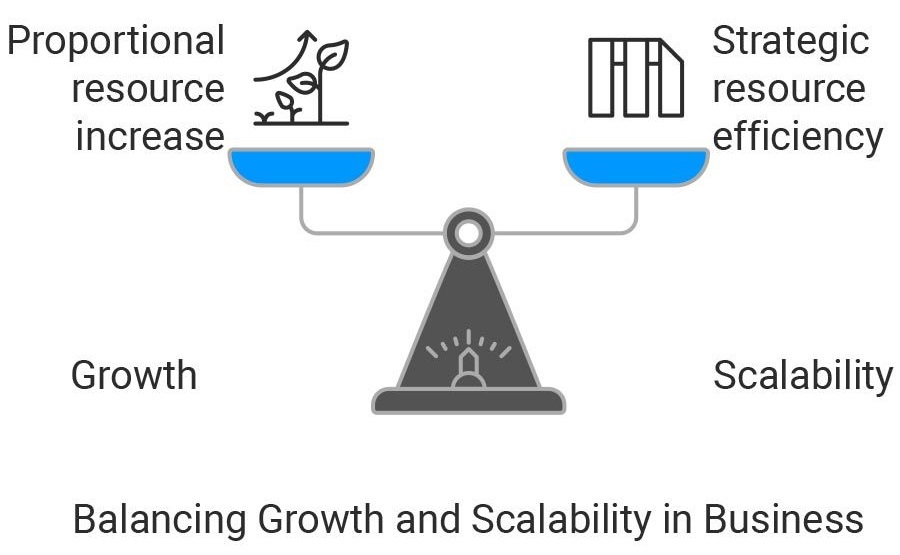
Table of contents
Imagine your company is growing rapidly, and you see sales increasing, customers raining down, and opportunities exploding. What if your company isn’t ready to deal with that growth volume? That’s where enterprise scalability comes in. It’s not just a new word. The change makes a difference in the medium or long term.
Key Facts About Enterprise Scalability and the Cloud
This Findstack article shows some critical data on cloud adoption statistics.
- The cloud computing market is expected to worth $1251.09 billion by 2028.
- 92% of enterprises already operate their IT infrastructure in the cloud to improve scalability.
- SMBs are leading adoption, driven by the need to grow without large investments.
- 70% of companies run more than half of their processes in the cloud to optimize resources.
Scalability does not happen by chance. It requires planning, strategy, and, above all, the right tools. That’s why we will break down everything you need to know about enterprise scalability, what it is, why it’s crucial, and how to prepare for the future with practical and affordable solutions.
Because, in the end, we all want the same thing: to grow smartly and sustainably. Are you ready to scale? Let’s get to it!
What is Enterprise Scalability?
The term “enterprise scalability“ describes a business’s ability to expand and cope with an increase in demand or activity without negatively affecting its performance, quality, or efficiency. In other words, scalability is the ability to expand the business without seeing costs grow in the same proportion or resources being overwhelmed.
A company can be scalable if it can expand its radius of scope, improve its volume of work, or serve more customers without making drastic changes or making excessive investments.
Difference between Growth and Scalability
Business growth implies increasing the company’s capacity, whether in revenue, customers, infrastructure, or personnel. However, this growth is usually linked to a proportional increase in resources such as time, money, or effort.
Scalability, on the other hand, refers to a business’s ability to increase its scope or volume of operations without costs growing in the same proportion. It is a more strategic and efficient approach that seeks to maximize results while minimizing additional investment.

Benefits of Implementing an Enterprise Scalability Model
Opting for a scalable model not only prepares your company for the future but also gives it the flexibility and strength to face the challenges of growth.
Here are the main benefits of betting on enterprise scalability:
- Sustainable Growth
With a scalable model, your business can grow without a commensurate cost increase. It means you can serve more customers, expand into new markets, or handle a higher volume of operations without compromising quality or stretching your resources.
- Operational Efficiency
Scalable models often rely on automation and technology, which reduces the need for manual processes and minimizes errors. It not only saves time but also improves team productivity.
- Cost Reduction
Enterprise scalability is designed to maximize resource use. It means you can do more with less, lowering operating costs and optimizing your profitability as you grow.
- Flexibility to Adapt to Change
A scalable business can respond quickly to changes in the marketplace, such as spikes in demand, new opportunities, or even unexpected crises. This agility is essential to staying competitive.
- Improved Customer Experience
A scalable model allows you to offer consistent service even as your customer base grows. It builds trust, loyalty, and a better perception of your brand.
- Simplified Global Expansion
Scalability allows companies to explore new markets without large upfront investments. With the right technology, you can operate in different regions while maintaining centralized management.
- Preparing for the Future
It solves your business’s current needs and prepares it for future challenges, ensuring its competitiveness and long-term viability.
Types of Enterprise Scalability
Enterprise scalability is a broad concept that applies to various business areas, from operational to technological. Below, we explore the main types of scalability and their practical applications.
Operational Enterprise Scalability
This type of scalability ensures that a company’s internal processes can handle a greater volume of work without losing efficiency. This is achieved through automation, standardization of workflows, and the use of tools that reduce redundancies.
- Practical example: An online store that implements an automated inventory management system to process orders faster without adding additional staff.
Enterprise Technology Scalability
Technology scalability means IT systems and infrastructure can accommodate growth without disruption or disproportionate costs. It includes servers, storage, networks, and software.
- Practical example: Migrating to a cloud-based VoIP system that allows you to add users or functionality without purchasing additional physical equipment.
Financial Enterprise Scalability
This type of scalability focuses on ensuring that a company’s revenue can grow at a rate that exceeds the increase in operating costs. It is critical to maintaining a profitable business as it expands.
- Practical example: A company that uses a subscription business model to ensure recurring and predictable revenue, avoiding reliance on one-off sales.
Human Enterprise Scalability
Human scalability refers to the team’s ability to adapt to the company’s growth, either through training, specialization, or the use of tools that improve their productivity.
- Practical example: Implement e-learning platforms such as LinkedIn Learning to train employees in new skills without disrupting daily operations.
Functional Enterprise Scalability
This type of scalability relates to a company’s ability to diversify or expand its products and services without significant complications. It is about responding to market needs efficiently.
- Practical example: A software company that adds features such as data reporting or advanced reporting to its core product, increasing its value to existing customers.
Geographic Enterprise Scalability
A company can expand into new markets or geographic locations while maintaining operational consistency and centralized management.
- Practical example: A franchise that uses tools such as HubSpot to coordinate marketing campaigns across multiple regions, ensuring a consistent but adaptable approach to each market.
Scale without chaos
Don’t let communication slow your growth. Use a scalable solution that allows you to add users instantly, manage global calls, and reduce costs without extra infrastructure. This gives you total flexibility to grow without limits.
Key Elements to Achieve Enterprise Scalability
Automation is one of the most important pillars of enterprise scalability. By reducing or eliminating manual tasks through technology, companies can handle a greater volume of work with the same resources, increasing operational efficiency.
Tools such as business management systems, automated e-commerce platforms, or billing software simplify key processes, allowing the team to focus on strategic activities.
It saves time, minimizes errors, and reduces costs in the long run.
Conversely, adopting flexible and scalable technologies is critical. Cloud-based solutions, such as VoIP platforms, CRM systems, or collaboration tools, allow companies to quickly adapt to growth or market changes without large upfront investments.
These technologies allow for expanding functionality, integrating new users, or handling increased demand without compromising quality.
Also, using clear metrics to evaluate performance and customer experience helps identify areas for improvement, ensuring that growth is sustainable and strategically aligned with business objectives.
Technologies that Drive Enterprise Scalability
Cloud solutions offer flexibility and immediate savings. Platforms such as AWS or Google Cloud allow you to scale resources on demand, eliminating the need to invest in physical infrastructure. They also facilitate remote work and real-time collaboration, keeping the enterprise agile and ready for change.
Artificial Intelligence (AI) and Big Data empower fast, data-driven decisions. AI automates tasks such as customer service and predictive analytics, while Big Data identifies trends and opportunities. Together, these technologies help optimize resources and anticipate market needs.
Scalable software ensures that systems grow at the pace of the business. Tools such as CRMs and modular ERPs allow the integration of new functions without interruption. Their adaptability ensures efficient operations and prepares companies for any challenge.
Transition from General to Technology Solutions
Scalability in business communication is key to smooth growth. As companies expand their reach, they need communication systems that support that expansion without losing quality or efficiency.
Modern communication solutions, such as cloud-based tools and integrated systems, make businesses more agile. They enable smoother team coordination, reduce costs, and facilitate real-time collaboration.
VoIP solutions stand out for their direct impact on operational scalability. They offer flexibility to add users, manage calls, and connect teams in different locations, all at a lower cost and without complex infrastructure.
Enterprise Scalability with VoIP Key to Modern Enterprise Communication
To understand how modern communication can be achieved through enterprise scalability, it is important to understand what VoIP is (Voice over IP). VoIP is much more than calls over the Internet; it is the backbone of modern, flexible communication. It allows businesses to manage their communications without relying on traditional phone lines, making it a must-have tool for scalable growth.
Unlike traditional phone systems, VoIP is cheaper, easier to implement, and highly adaptable. You can add users, integrate tools such as CRM, and work from anywhere, all without complications or exorbitant costs.
VoIP’s technical scalability is a strength: You can handle peaks in demand or expand your team without losing call quality.
Why Choose VoIPstudio for Enterprise Scalability
If you are looking for a VoIP communication solution that is easy to implement, affordable, and backed by exceptional support, VoIPstudio is the ideal choice for your business. Designed to fit any size business, VoIPstudio offers a robust platform with advanced PBX features that facilitate scalability and operational efficiency.
 Easy to Implement
Easy to Implement
VoIPstudio is designed for hassle-free implementation. As a cloud-based service, it does not require complex physical infrastructure or advanced technical expertise. You can easily configure and manage your business phone system, allowing your team to focus on core business activities.
Exceptional Support
VoIPstudio’s support team is dedicated to resolving any concerns or issues you may have. They offer assistance to guide you through the implementation and use of the system, ensuring that you get the most out of all the features available.
Advanced PBX Features
VoIPstudio provides a wide range of features designed to improve business efficiency and productivity:
- Complete Call Center: A fully-featured call center, directly from the cloud, ready to start today.
- Call Recording: Unlimited call recording can help you manage compliance and performance.
- Collaboration: Bring your teams with collaboration features, including video calls and conferencing.
- Virtual Switchboard: Manage your calls in real-time with drag-and-drop call control.
- Virtual Numbers: Thousands of cities and millions of virtual VoIP numbers to choose from, both geographic and non-geographic.
Over 40 Advanced Call Control Features, build IVR, routing, and call management systems.
These features enable companies to improve internal and external communication, streamline processes, and enhance the customer experience.
Reliability and Performance
Designed to withstand high demands without interruptions, VoIPstudio guarantees smooth and constant communication. Its cloud infrastructure ensures that your phone system is always available, allowing you to scale your operations without worrying about capacity or performance.
Frequently asked questions about business scalability
What is the difference between growing and scaling a business?
- Growing a business means increasing revenue, customers, or production, but with a proportional increase in costs and resources. More employees, infrastructure, and investment are needed to support that growth.
- Scaling a business, on the other hand, means expanding without increasing costs at the same rate. This is achieved by optimizing processes, automating tasks, and using scalable technology. In this way, a company can increase its operational capacity and generate more revenue without multiplying its expenses.
In short, growth is linear and costly, while enterprise scalability allows for efficient and sustainable expansion.
What does it mean to scale a company?
Scaling a company means increasing its operating capacity, sales, or scope without increasing costs in the same proportion. It is a strategic process that allows the business to expand sustainably and efficiently, optimizing resources and maximizing profitability.
Business scalability involves automating processes, adopting flexible technologies, and structuring business models that support growth without compromising quality or operations. Scalable companies can expand their market, increase their customer volume, and expand their team without generating cost overruns or slowing down their development.
More from the blog
Want to improve your business communication?
Unlock enterprise-class call center power at affordable prices – no hardware, no delays, no surprises!







